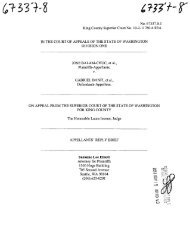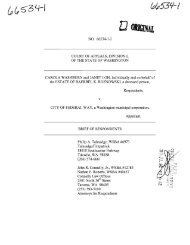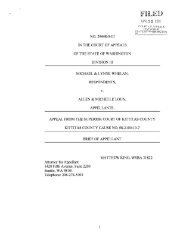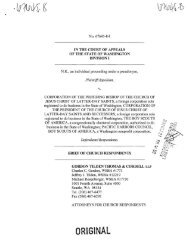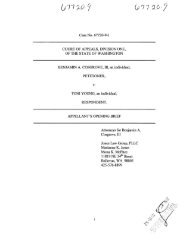Appellants' Reply Brief - Washington State Courts
Appellants' Reply Brief - Washington State Courts
Appellants' Reply Brief - Washington State Courts
Create successful ePaper yourself
Turn your PDF publications into a flip-book with our unique Google optimized e-Paper software.
Estate, 70 Wn. App. at 488; Lloyds of Yakima Floor Center v. Dep 't of<br />
Lahor & Indus., 33 Wn. App. 745, 753, n.3, 662 P.2d 391 (1982); Dana's<br />
Housekeeping, Inc. v. Dep 't of Lahor & Indus., 76 Wn. App. 600, 606-07,<br />
886 P.2d 1147 (1995).<br />
Here, there is no dispute that Malang elected coverage for herself,<br />
so she apparently was otherwise excluded from coverage under one of the<br />
three exceptions just noted. But, as noted above, it is not relevant to this<br />
appeal how Malang obtained industrial insurance coverage. All that<br />
matters is that she was both her own employer and employee (or, put<br />
another way, owner and employee), that she (as her own employer) did<br />
not pay herself (as her own employee) a fixed hourly, daily, weekly or<br />
monthly wage rate RCW 5 1.08.178(1), and therefore a wage-equivalent<br />
had to be "fairly and reasonably determined" per RCW 51.08.178(4) in<br />
order to determine her lost wage earning capacity. See AB at 23-24,<br />
E. The Department Is Realistic In Its Argument That Malang's<br />
Gross Income Theory Yields Absurd Results<br />
1. Malang's position that gross receipts = gross income =<br />
gross earnings = wages yields a hyper-inflated wage rate<br />
that disproportionately favors self-employed individuals<br />
over employees who work for wages<br />
The Department explained in appellant's brief at pages 38-41 that<br />
Malang's theory that gross business receipts = gross business income =



